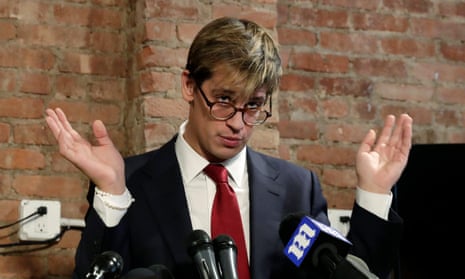It’s not been a good week for the unassailable principle of free speech, that’s for sure. First Milo Yiannopoulos, the pied piper of the “alt-right” (they’re a bunch of white supremacist Pee-wee Hermans, in case you were wondering), lost his job, his book deal and the chance to give a keynote speech at CPAC conference for the American Conservative Union, after a recording emerged of him apparently condoning paedophilia, noting: “You can get quite hung up on this child abuse thing.”
This came as a surprise to me, I have to say. Given so many on the right – and indeed, mainstream liberals – defended Yiannopoulos’s incessant public appearances using free speech arguments, I expected him to turn up on another late-night chat show to debate the merits of paedophilia via the Socratic method. Why didn’t this happen? Do we want a free marketplace of ideas or not?
A little closer to home, the University of Sussex has been embroiled in a strange and ultimately meaningless brouhaha. A week and a half ago, the Sussex Centre for Conflict and Security Research (SCSR) held an hour-long informal meeting called “Dealing with rightwing attitudes and politics in the classroom”. Despite the fact that this meeting quietly passed without consequence, and was attended by just 10 or 12 junior faculty members and PhD students, it somehow found its way into no fewer than three articles in national newspapers as an example of free speech under threat.
One self-described rightwing Sussex student breathlessly recounted his incandescence in the Daily Telegraph that a poster (a poster!) had been affixed to a door “for all to see”, leading to an embarrassingly craven statement from the SCSR that “silencing student voices is never what we aspire to as a department”.
Quite how the mere act of discussing rightwing attitudes amounts to “silencing” is unclear; nevertheless, someone who was actually at the meeting tells me that the few gathered participants spent most of the hour sharing their experiences of misogyny and xenophobia, not coming up with a Machiavellian scheme to introduce censorship. In fact, the meeting was only held after tutors requested it at an earlier meeting because they were worried about how to talk to their students about political shocks such as Brexit and the election of Donald Trump (these informal meetings happen once a week at SCSR and cover a variety of topics; this is the first that has led to any baffling hysteria).
What do these two incidences tell us about the infernal free speech debate? They tell us that it isn’t really a debate about free speech at all; it’s a debate about acceptable speech. Apparently Yiannopoulos could go on to have a glittering career after calling an ex-employee “a common prostitute” and threatening to blackmail her after she complained about unpaid wages. Apparently it’s fine for someone like him to occupy a considerable public platform after he encouraged the racist and misogynistic targeting of actor Leslie Jones.
Public figures who insisted on Yiannopoulos’s right to free speech after all these incidences, but not after he appeared to condone paedophilia, aren’t making a statement about liberal values; they are simply revealing what they themselves are willing to tolerate. His demise reveals that at the end of the day we all believe there should be limits to freedom of speech. The only difference between us is where we draw the line.
Moreover, the pint-sized moral panic over a single seminar at the University of Sussex suggests that – for the right – freedom of speech only travels in one direction. As soon as anyone dissents from their enforced values and behaviour, all hell breaks loose. Remember when the right lost its mind because Jeremy Corbyn’s bow on Remembrance Day was deemed insufficiently dramatic? Or consider the traditional national angst over the possibility that some local authorities might use the word “Winterval” instead of “Christmas”.
If we were genuinely debating freedom of speech, and not in fact having an ideological battle over the values that define our public sphere, quite a few of Yiannopoulos’s defenders would probably have defended Corbyn and Winterval too. They certainly wouldn’t now be reaching for the smelling salts because 10 people at the University of Sussex decided to talk about rightwing views one lunchtime.
What is happening here is threefold: first, the right is so accustomed to its values dominating public discourse that many people within it have become grown-up babies who can’t bear to live in a society that isn’t constantly pandering to their sensitivities (what the writer Arwa Mahdawi describes as “populist correctness”). Second, others on the right are shrewdly exploiting the important principle of freedom of speech to ensure their ideas are the prevailing ones in society, by claiming any challenge to them as oppression. And finally, these groups are being aided and abetted by liberal dupes and cowardly university institutions, both of which are convinced that they’re engaged in an impartial debate about enlightenment values that isn’t actually taking place.
Enough is enough. The insistence that we exist in some kind of neutral marketplace of ideas has led to a situation where deeply ideological positions can be put forward without any moral value being ascribed to them. “The most marginalised position in public discourse today is ‘good things are good and bad things are bad’,” as academic philosopher Tom Whyman puts it.
Sexism and racism are, in fact, worse than equality – and public figures and institutions should not retreat into the belief that acknowledging as much amounts to some sort of discrimination. If we are going to have a debate, let’s debate what kind of society we want to build and what kind of values we want to live by. Let’s be clear that bigotry is intolerable. Because the Milo Yiannopouloses of this world know exactly what they’re doing – the only ones equivocating are us.








